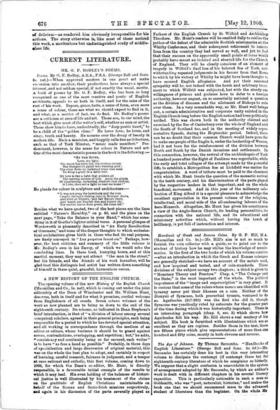A NEW HISTORY OF THE ENGLISH CHURCH.
The opening volume of the new History of the English Church (Macmillan and Co., 5s. net), which is coming out under the joint editorship of the Dean of Winchester and Mr. William Hunt, deserves, both in itself and for what it promises, cordial welcome from Englishmen of all creeds. Seven octavo volumes of the work as now planned are to bring us down to the end of the eighteenth century. Its scheme, as indicated in Dean Stephens's brief introduction, is that of "a division of labour among several competent scholars, agreed in their general principles, each being responsible for a period to which he has devoted special attention, and all working in correspondence through the medium of an editor or editors, whose business it should be to guard against errors, contradictions, overlapping, and repetition; but," he adds, consistency and continuity being so far secured, each writer" is to have " as free a hand as possible." Probably, in these days of specialisation and large discoveries of original material, this was on the whole the best plan to adopt, and certainly in respect of learning, careful research, fairness in judgment, and a temper at once rational and catholic, this first volume, coming down to 1068, for which the Dean's co editor, Mr. Hunt, is directly responsible, is a favourable initial example of the results to which it may lead. His even holding of the balances of histori- cal justice is well illustrated by his treatment of the claims on the gratitude of English Christians maintainable on behalf of the Roman and Scoto-Irish missions respectively, sad again in his discussion of the parts severally played as Fathers of the English Church by St. Wilfrid and Archbishop Theodore. Mr. Hunt's readers will be enabled fully to realise the pathos of the defeat of the admirable Scottish missionaries at the Whitby Conference, and their subsequent retirement to 'remote Iona from the country they had served so well, and Yet to-feel that their euccess on the apparently small points at issue Would probably have meant an isolated and stunted life for the Church I of England. They will be clearly conscious of an .eletient of tragedy in Wilfrid's final loss of his beloved See of York, not- withstanding repeated judgments in his favour from that Rome to which by his victory at Whitby he might have been thought to have secured English allegiance. And yet their reasoned sympathy will be, not indeed with the harsh and arbitrary treat- ment to which Wilfrid was subjected, but with the sturdy un- willingness of princes and prelates here to defer to a foreign authority, however august, on so essentially national a question as the division of dioceses and the allotment of Bishops to rule over them. In a very remarkable way, as Mr. Hunt well brings out, a certain administrative and corporate unity existed in the 'English Church long before the English nation had been politically unified. This was shown both in the authority claimed and exercised by the See of Canterbury over the whole of England and the South of Scotland too, and in the meeting of widely repre- sentative Synods, during the Heptarchic period. Indeed, there can be no doubt that their common Church would have gone far to make one people of the Englis h, under the leadership of Wessex, had it not been for the reinforcement of the division between North and South by the Danish invasions and settlements. In this connection, however, the revival of the archbishopric of York a hundred years after the flight of Paulinus was regrettable, while the early and total collapse of the attempt made by the powerful Offa to establish a Metropolitan See at Lichfield was matter for congratulation. A word of tribute must be paid to the clearness with which Mr. Hunt treats the question of the monastic revival in the tenth century, and his discrimination of the parts played by the respective leaders in that important, and on the whole beneficial, movement. And in this year of the millenary cele- bration of Ring Alfred it is a special pleasure to acknowledge the excellent appreciation in the present volume of the religions, intellectual, and moral side of the all-embracing labours of the hero-Monarch. Altogether, Mr. Hunt has given his countrymen a view of the Anglo-Saxon Church, its leading personalities, its connection with the national life, and its educational and missionary activities which, without having the touch of brilliancy, is yet full of instruction and interest.






































 Previous page
Previous page